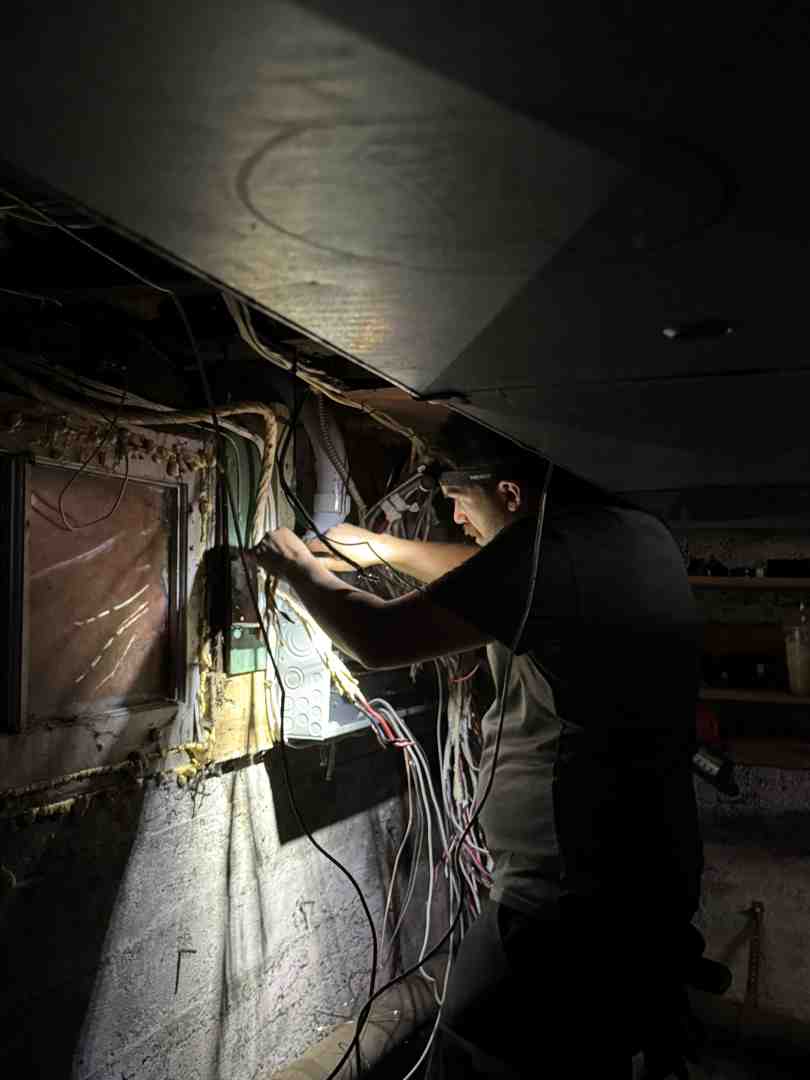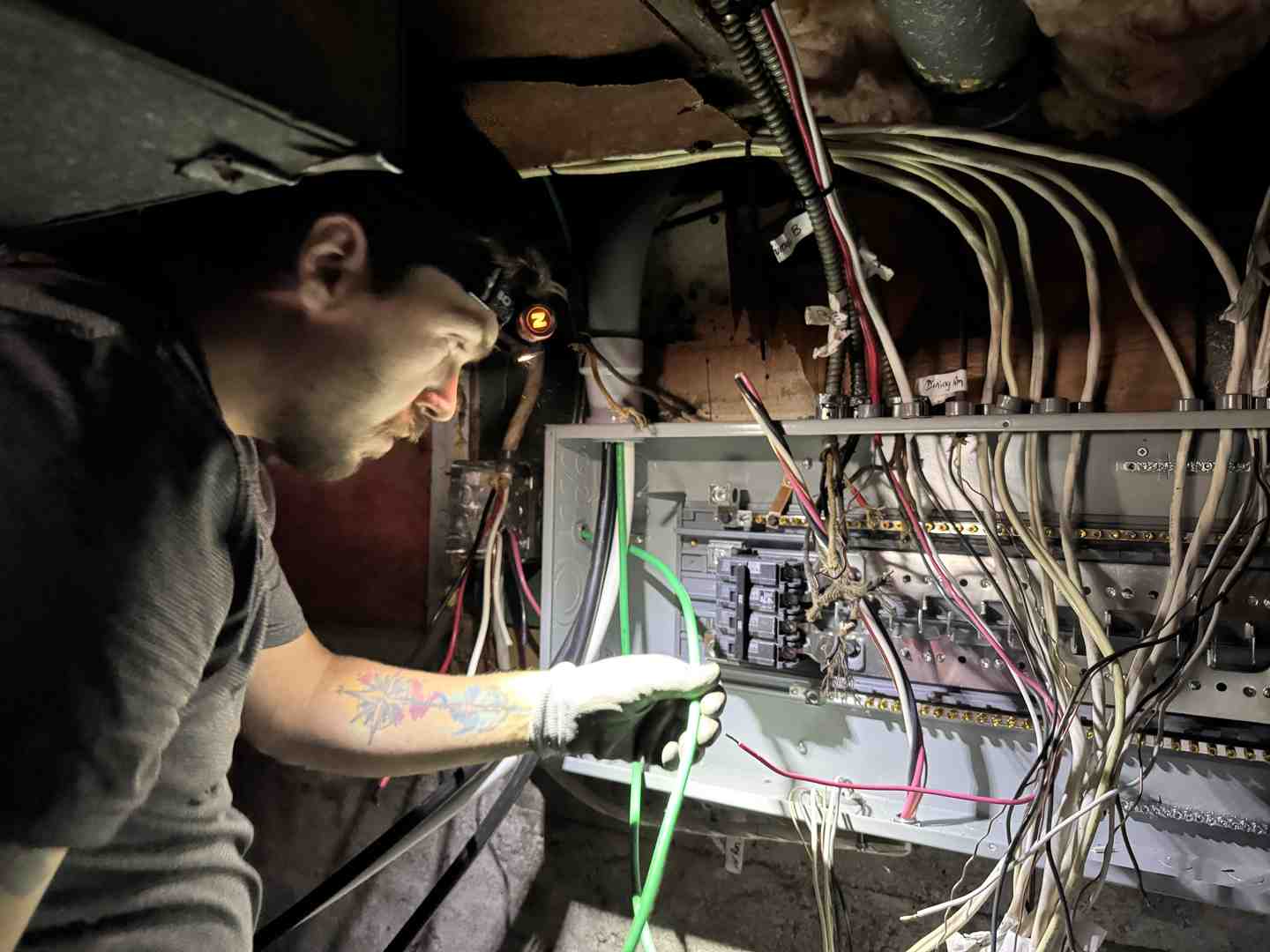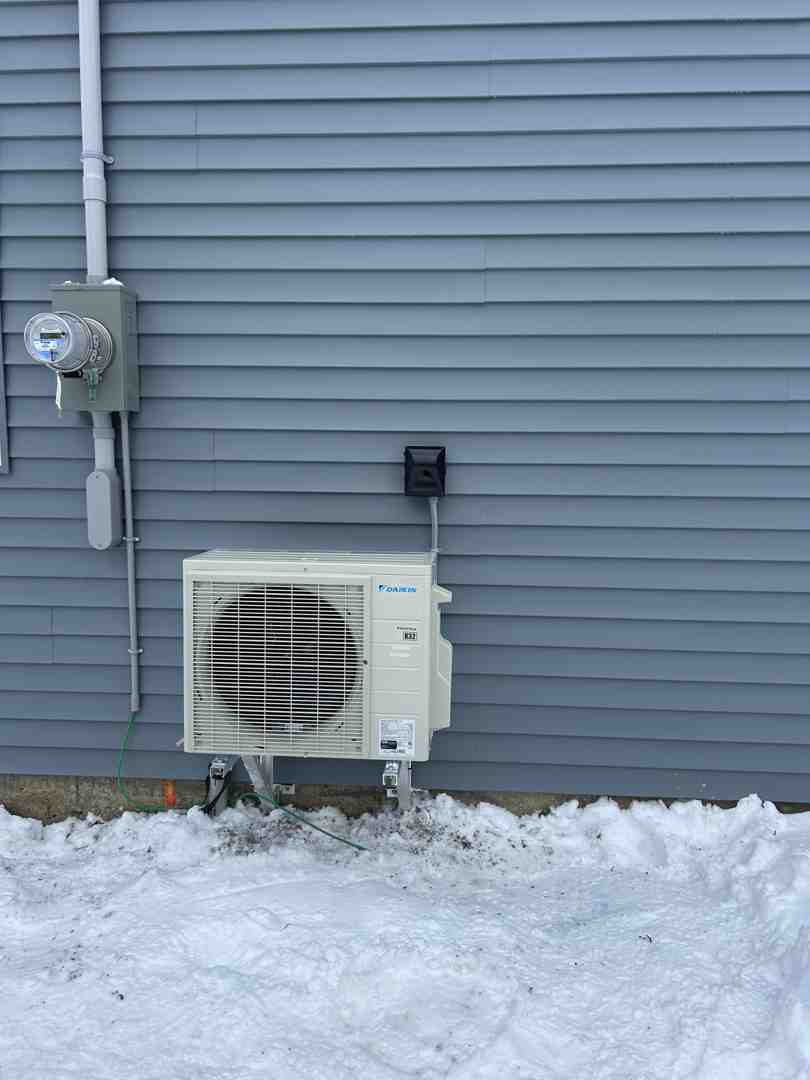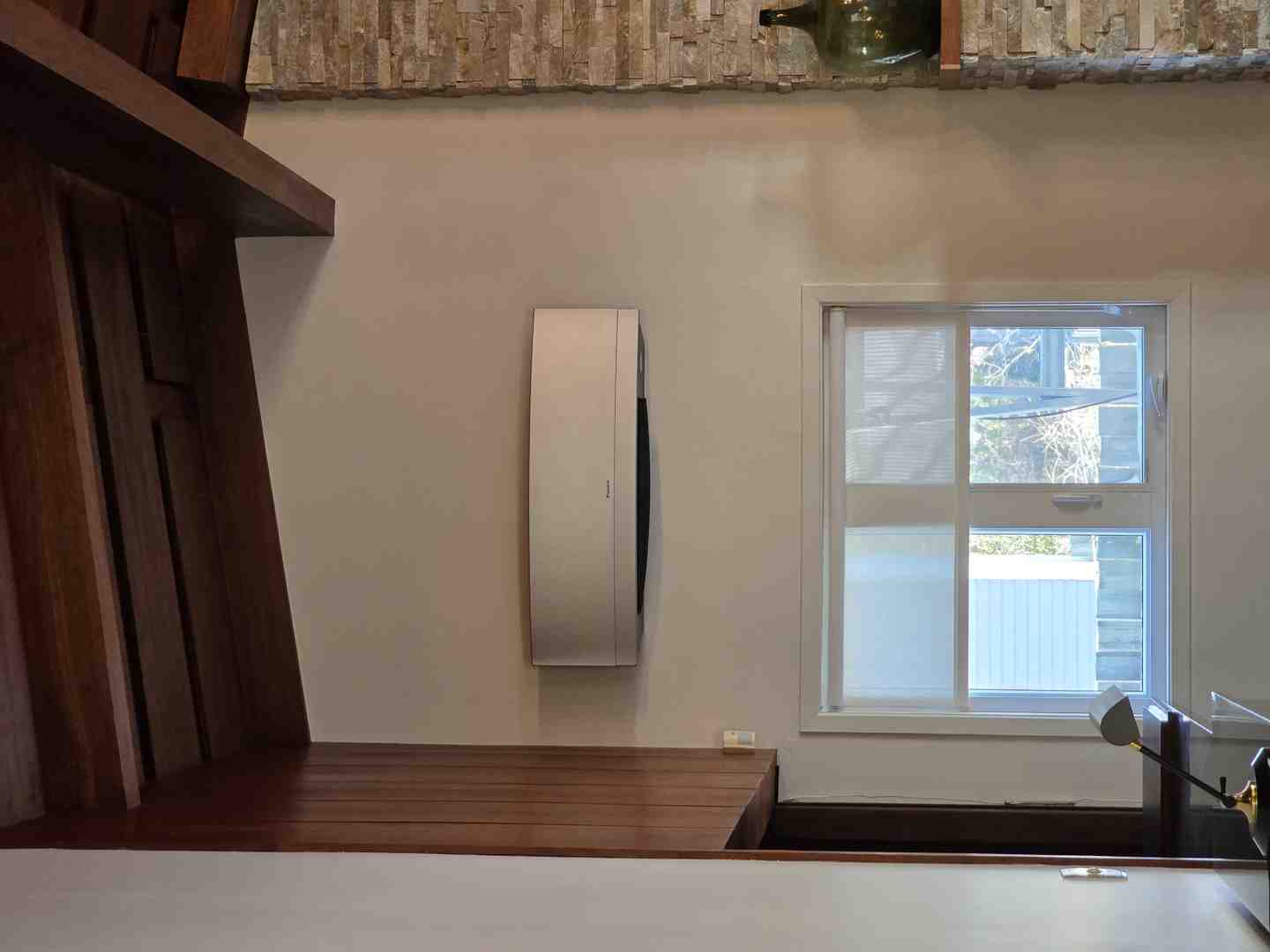
Have you owned a mini-split (ductless) heat pump for three or more years? Has it been professionally cleaned? Regular upkeep is essential to ensure your unit operates efficiently and provides clean, healthy air for your home. Over time, dust, dirt, and even mold can accumulate inside your unit, affecting its performance and indoor air quality.
Due to the moisture circulating within the system, mold, bacteria, and other contaminants can develop on the coils and fan components of your mini split heat pump. If left uncleaned, this buildup can:
To prevent these issues, we recommend having your mini-split (ductless) heat pump professionally cleaned approximately every three years.
For a better understanding of how the Presidential Ventilation Systems Ltd. process works, watch the video below!
If you prefer to read the steps, here’s a breakdown of what our technicians do during a professional cleaning:
If the outdoor unit also needs cleaning, our technician will use a pressure washer to remove debris from the coils and fan blades, ensuring maximum performance. This helps maintain proper airflow and prevents strain on the system, extending its lifespan.
While keeping your mini-split (ductless) heat pump clean is essential, integrating an HRV system (Heat Recovery Ventilation system) can further enhance your home’s air quality. HRV Systems works by exchanging stale indoor air with fresh outdoor air while recovering heat from the outgoing air, making them an energy-efficient solution for ventilation.
When paired with a properly maintained mini split heat pump, an HRV system ensures your home remains comfortable, energy-efficient, and free from airborne pollutants.
We specialize in HRV systems, mini-split (ductless) heat pump cleaning, and other ventilation solutions to help homeowners breathe cleaner air. As Daikin Comfort Pros, we service most brands of heat pumps, ensuring professional, reliable service every time.
Please note that while a Red Seal technician is not required for a cleaning, we always aim to provide one when available for your peace of mind.
If you wish to schedule your mini split heat pump cleaning or have questions about HRV systems, contact us today! Call us now at 902-832-1067. Our expert team is ready to help improve your indoor air quality and make sure your system runs at peak efficiency. Don’t wait until issues arise—regular maintenance keeps your home comfortable and energy-efficient.



When you need electrical harrietsfield ns services, you're looking for qualified professionals who can handle everything from routine panel upgrades to complete home rewiring. Harrietsfield is a small community of 849 residents in 327 dwellings along Nova Scotia's scenic Chebucto Peninsula, and finding the right electrician means ensuring your home stays safe, efficient, and code-compliant.
Quick Guide to Finding Electrical Services in Harrietsfield:
Whether you're dealing with an outdated electrical panel, planning a renovation, or need specialized work like heat pump installation, local electricians offer comprehensive residential and commercial solutions. The key is choosing contractors who understand Nova Scotia's building codes and safety requirements while delivering reliable, efficient service.
For comprehensive HVAC and electrical expertise, explore our full range of services, or get started with a free assessment of your electrical needs.

Welcome to our guide for navigating electrical Harrietsfield NS services! As homeowners, we often take our electrical systems for granted – until something goes wrong. From the moment we flip a switch to the comforting hum of our appliances, electricity powers our daily lives. But behind every working light and every charged device lies a complex network that requires professional care. For the residents of Harrietsfield, with its cozy community of 327 dwellings, ensuring this network is safe, efficient, and up-to-date is paramount. That's where we come in, offering insights into the essential services, how to find trusted professionals, and what you need to know to keep your home running smoothly.
Our goal is to illuminate the path to reliable electrical solutions, helping you understand the breadth of services available and the importance of choosing qualified experts. We believe that an informed homeowner is a empowered homeowner, especially when it comes to something as vital as electricity. So, let's explore how to keep your Harrietsfield home bright, safe, and fully powered.
When we talk about electrical Harrietsfield NS services, we're covering a wide array of needs that keep our homes functional and safe. From the moment you purchase a home to ongoing maintenance and upgrades, a reliable electrician is your best friend. For the 327 dwellings in Harrietsfield, these services are not just conveniences; they are necessities for modern living.
Here are some of the main residential electrical services we provide and that you can expect from qualified electricians in the Harrietsfield area:
Choosing a professional for these essential services means peace of mind, knowing that your home's electrical system is in capable hands. We pride ourselves on delivering top-notch service for all your residential electrical needs. To learn more about how we can help power your home safely and efficiently, visit our dedicated page on electrical services in Harrietsfield.
Beyond the everyday electrical services, homeowners in Harrietsfield often look for specialized solutions that improve comfort, increase energy efficiency, and provide critical backup during power outages. These advanced installations require specific expertise and careful planning, ensuring they integrate seamlessly and safely with your existing electrical infrastructure.
These specialized electrical installations are investments in your home's future, offering improved comfort, reliability, and efficiency. We ensure that every specialized project is executed with precision and adheres to the highest safety and quality standards. For more information on how these services can benefit your Harrietsfield home, explore our comprehensive electrical services.
Ensuring the safety and compliance of your home's electrical system is paramount. In Harrietsfield, as in all of Nova Scotia, electrical work is governed by strict regulations and safety standards designed to protect homeowners and properties. Understanding these guidelines and choosing qualified professionals is crucial for any electrical Harrietsfield NS project.
Our commitment to safety begins with employing highly skilled professionals. We believe that every homeowner deserves the peace of mind that comes from knowing their electrical work is done right. This is why we rely on Red Seal Electricians. A Red Seal endorsement signifies that an electrician has met the national standard of excellence in their trade, demonstrating a high level of skill and knowledge. This certification is a benchmark of quality and competence, ensuring that the professionals working in your home are among the best in Canada.
Another key indicator of a trustworthy electrical contractor is accreditation from the Better Business Bureau (BBB). Looking for a BBB-accredited electrician with a high rating (like an A+) provides an extra layer of assurance. The BBB evaluates businesses based on their adherence to ethical practices, customer service, and complaint resolution. When you choose a BBB-accredited professional, you're opting for a company that has demonstrated a commitment to integrity and customer satisfaction. The BBB lists over 440 results for electricians near Harrietsfield, NS, making it a valuable resource for your search.
Safety inspections are a non-negotiable part of maintaining a healthy electrical system. Regular inspections can identify potential hazards, ensure proper grounding, check for overloaded circuits, and verify that all installations meet current safety codes. This proactive approach can prevent serious issues down the line, safeguarding your home and loved ones.
To illustrate the evolution of safety, consider the differences between older electrical systems and modern installations:
| Feature | Standard Wiring (Older Homes) | Modern Safety Upgrades (Newer Homes & Renovations) |
|---|---|---|
| Wiring Type | Often knob-and-tube or early plastic sheathed wiring | Non-metallic (Romex) sheathed cable with ground wire, often copper |
| Panel Capacity | 60-100 amp panels, screw-in fuses or older circuit breakers | 100-200+ amp panels, modern circuit breakers (AFCI/GFCI) |
| Grounding | Limited or no grounding in many circuits | Extensive grounding throughout the system for safety |
| Outlets | Two-prong ungrounded outlets, no GFCI/AFCI protection | Three-prong grounded outlets, GFCI outlets in wet areas, AFCI in living spaces |
| Safety Devices | Few to no smoke/CO2 detectors, no whole-home surge protection | Hardwired smoke/CO2 detectors, whole-home surge protectors, tamper-resistant outlets |
| Code Compliance | Based on older, less stringent codes | Adheres to the latest Canadian Electrical Code standards |
Upgrading from older systems to modern safety standards is not just about convenience; it's about crucial protection for your home and family.
Any significant electrical work in your Harrietsfield home requires proper permits. This isn't just bureaucratic red tape; it's a vital step to ensure that all work is inspected and meets the safety standards set by the province and the Halifax Regional Municipality (HRM).
When starting on an electrical Harrietsfield NS project, whether it's a panel upgrade, new wiring installation, or major renovations, you'll need to obtain permits from the appropriate authorities. These permits ensure that licensed electricians perform the work and that it complies with the Canadian Electrical Code (CEC) and local HRM regulations. Nova Scotia Power also has specific requirements and standards that must be met, especially when dealing with service entrances or new connections.
We handle the permit process for our clients, ensuring all necessary paperwork is filed correctly and inspections are scheduled. This saves you time and stress, guaranteeing that your electrical project is fully compliant and safe from start to finish. Ignoring permit requirements can lead to fines, difficulties with insurance, and potentially dangerous electrical installations.
Beyond permits, adherence to stringent safety standards is non-negotiable for all electrical work. Our priority is the safety of your home and family.
Key safety standards we uphold include:
By focusing on these safety standards, we ensure that your electrical system is not only functional but also provides a secure environment for your family. We are committed to upholding the highest safety protocols in every project we undertake.
For homeowners in Harrietsfield looking to upgrade their electrical systems, especially with an eye towards energy efficiency, there's good news! Government programs offer incentives that can help offset the cost of making your home greener and more efficient. These programs are designed to reduce greenhouse gas emissions across Canada by encouraging homeowners to invest in energy-saving solutions.
One of the most significant initiatives is the Canada Greener Homes Grant. This federal program can provide eligible homeowners with up to $5000 for energy efficiency upgrades. While the grant covers a range of home improvements, many electrical upgrades, particularly those related to heating, cooling, and smart home technology, can qualify. For instance, installing new, energy-efficient heat pumps often falls under this grant, which requires specialized electrical wiring. The grant aims to help Canadians reduce their energy consumption, lower their utility bills, and contribute to a more sustainable future.
In addition to federal programs, Efficiency Nova Scotia offers its own set of incentives and rebates. These provincial programs often complement federal grants, providing further savings for homeowners who choose energy-efficient products and services. Efficiency Nova Scotia can offer rebates on everything from heat pump installations to smart thermostats and insulation, which indirectly benefits from a well-functioning and upgraded electrical system. To access these programs, you typically need to undergo a home energy assessment to identify the most impactful upgrades for your specific dwelling.
By taking advantage of these grants and incentives, you can:
We can guide you through the process of identifying eligible upgrades and help you understand how to steer the application process for these valuable grants and incentives. Our goal is to make your Harrietsfield home not just brighter, but also smarter and more energy-efficient.
We understand that you might have several questions when it comes to finding and working with electricians in Harrietsfield. Here, we address some of the most common inquiries to help you make informed decisions.
Finding a qualified electrician for your electrical Harrietsfield NS needs is crucial for ensuring safety and quality workmanship. Here's our advice:
By following these steps, you can confidently choose a qualified and trustworthy electrician for your home.
Homes in Harrietsfield, like many communities, can experience a range of electrical issues. While every home is unique, some common problems we often encounter include:
Addressing these common issues promptly with a professional electrician can prevent more serious problems and ensure the long-term safety and efficiency of your home's electrical system.
Absolutely! As we discussed, there are excellent opportunities for homeowners in Harrietsfield to receive financial assistance for energy-efficient electrical upgrades.
These programs are invaluable for making your home more sustainable and reducing your energy costs. We encourage you to explore these options and see how you can benefit from them to make your electrical Harrietsfield NS upgrades more affordable.
Navigating electrical Harrietsfield NS services doesn't have to be a shocking experience! With a clear understanding of the essential services, specialized solutions, and crucial safety standards, you're well-equipped to make informed decisions for your home. From ensuring your residential wiring is safe and up-to-code, to embracing energy-efficient heat pumps and reliable backup generators, the right electrical partner can make all the difference.
We've explored the importance of choosing qualified Red Seal Electricians, the assurance that comes with BBB accreditation, and the financial benefits of government incentives like the Canada Greener Homes Grant and Efficiency Nova Scotia programs. For the community of Harrietsfield, with its unique charm and close-knit feel, maintaining safe and efficient electrical systems is key to comfortable living.
At Presidential Ventilation Systems, we bring over 30 years of experience to the table, not just in HVAC but also in providing top-tier electrical services for both residential and commercial clients. As a leading Daikin Comfort Pro Dealer, we understand the intricate relationship between efficient heating/cooling and a robust electrical system. Our commitment to exceptional service, long warranties, and energy-saving solutions extends to every electrical project we undertake. We believe in powering your home with professionalism and precision, ensuring your peace of mind.
Don't let electrical concerns dim your day. Whether you're planning an upgrade, need a repair, or are simply looking for expert advice, we're here to help.
Schedule your Harrietsfield electrical service today and let us illuminate your home with our expertise.



Knowing exactly when to pull the trigger on heat pump replacements in Truro NS can be tricky. You don’t want to replace a system that still has years of life left, but you also don’t want to wait until it fails completely during a February cold snap. Generally, if your system is over 15 years old, it is entering the "danger zone" where efficiency drops and mechanical failures become more common.
If you find yourself calling for heat pump repair services more than once a year, the cost of those "band-aid" fixes starts to outweigh the investment in a new, warrantied system. Beyond age, pay attention to your monthly utility bills. A sudden, unexplained spike in energy consumption often indicates that the compressor is working overtime to achieve the same results it used to reach with ease.
Performance decline isn't always a total system failure; sometimes it’s a slow fade. You might notice certain rooms in your Truro home feel drafty while others are sweltering. This uneven heating is a classic sign of a struggling indoor blower or a compressor that can no longer modulate correctly.
Airflow issues are another red flag. If the air coming from your vents or wall-mounted head feels weak or only lukewarm when it should be hot, the refrigerant cycle may be compromised. Furthermore, if your home feels unusually humid in the summer, your old heat pump is likely failing to perform its secondary job: dehumidification.
While air conditioners typically last 10–15 years, high-quality heat pumps can last 15–20 years with proper maintenance. However, Truro's coastal climate—with its salt air and extreme temperature swings—can accelerate wear and tear.
As technology advances, "obsolescence" becomes a factor. A 20-year-old unit uses significantly more power than a modern inverter-driven model. Even if the old unit is still "running," it may be costing you twice as much to operate as a new system would.
| Indicator | Repair Might Work | Replacement is Better |
|---|---|---|
| System Age | Under 10 years | Over 15 years |
| Repair Cost | Minor (e.g., capacitor) | Major (e.g., compressor) |
| Energy Bills | Stable | Consistently rising |
| Comfort | Even temperatures | Hot and cold spots |
| Noise Level | Quiet hum | Grinding or squealing |

Truro is often called the "Hub of Nova Scotia," and its weather is just as central to the conversation. We experience everything from humid summer afternoons to bone-chilling winter nights. This variability is exactly why heat pump services are so vital here. Unlike a furnace that only heats, or an AC that only cools, a heat pump is a year-round workhorse.
Heat pumps don't actually "create" heat through combustion or electric resistance (which is expensive). Instead, they use refrigerant to "move" heat. In the winter, they extract heat from the outside air—yes, even when it’s cold—and pump it indoors. In the summer, the process reverses, pulling heat out of your house and dumping it outside.
A common myth is that heat pumps stop working when the temperature drops below freezing. While this was true decades ago, modern heat pump replacements in Truro NS feature advanced inverter technology. These systems can modulate their speed, allowing them to extract warmth from the air even when temperatures dip to -25°C or lower.
By using a variable-speed compressor, the system doesn't just blast on and off. It stays on at a low, steady rate, maintaining a consistent temperature without the "swing" that makes some homes feel uncomfortable. This results in a system that is up to three times more efficient than traditional heating methods.
For the eco-conscious Truro resident, heat pumps are a major win. Because they move heat rather than burning fossil fuels, they dramatically reduce your home's carbon footprint. Modern units also use eco-friendly refrigerants like R-410A or R-32, which have lower global warming potential.
Beyond the planet, think about your lungs. High-quality systems, such as those featuring Panasonic's NanoeX technology, don't just move air; they clean it. They can filter out dust, allergens, and even certain viruses and bacteria, providing a much healthier indoor environment for your family.
Every home in Truro is unique, from the historic Victorians near Victoria Park to the newer builds in Bible Hill. Choosing the right heat pump installation in Truro NS depends on your home’s layout, insulation levels, and existing infrastructure.
If your home already has a central ductwork system (perhaps from an old oil furnace), a ducted heat pump in Truro NS is often the most seamless replacement. These systems provide whole-home comfort through your existing vents, ensuring every room stays at the exact same temperature.
For homes without ducts—or for those looking to add heating and cooling to a specific area like a new sunroom or a basement—ductless mini-splits are the answer. These consist of an outdoor unit connected to one or more indoor "heads" mounted on the wall. They allow for "zoned" comfort, meaning you can keep your bedroom cool while leaving the guest room at a different setting, saving energy in the process.
Most heat pump replacements in Truro NS are air-source systems because they are versatile and relatively easy to install. They sit outside your home and exchange heat with the surrounding air.
However, for those looking for the ultimate in long-term sustainability, geothermal (ground-source) systems are an option. These use underground loops to tap into the constant temperature of the earth. While the initial setup is more involved, geothermal systems can save up to 70% on heating, cooling, and hot water costs over their lifetime.
Many Truro residents are making the switch from oil to electric heat pumps, and for good reason. Oil prices can be volatile, and maintaining an old furnace is often a messy, smelly affair. Switching to an oil to heat pump conversion in Truro NS can reduce heating costs by as much as 50%.
Consider this: a typical homeowner might use over 2,600 liters of oil annually. After a professional heat pump installation, that same home might only require a fraction of that (for backup) or eliminate it entirely, resulting in net energy savings of over $1,600 per year. Removing an old oil tank also eliminates the risk of environmental leaks on your property.
Beyond the savings, the comfort level is simply higher. Oil furnaces often provide "bursts" of intense heat followed by cold periods. A heat pump provides a steady, gentle flow of warmth. If your current furnace is on its last legs, considering a furnace replacement in Truro NS that incorporates heat pump technology is the most future-proof move you can make.
Additionally, heat pumps are incredibly quiet. You won’t hear the loud "clunk" and roar of a furnace kicking on in the middle of the night. To ensure your home's electrical panel can handle the new system, it's always wise to consult with electrical services in Truro NS during the planning phase.
When you choose us for your replacement, the process is designed to be as stress-free as possible. It begins with a thorough property assessment. We don't just look at your old unit; we evaluate your insulation, window quality, and square footage to ensure your new system is sized perfectly. An undersized unit will run constantly, while an oversized unit will "short cycle," leading to premature wear.
Because a heat pump is a sophisticated piece of electrical equipment, having a licensed electrician in Truro NS on-site is crucial. They will ensure your home’s wiring is up to code and that the unit has a dedicated circuit for safe, efficient operation. For a deeper dive into home wiring, check out our electrical services Truro NS complete guide.
The actual physical replacement usually takes one to two days. We remove the old equipment, install the new indoor and outdoor components, run the refrigerant lines, and perform a series of rigorous operational tests to ensure everything is calibrated for Truro's specific climate.
Once your new system is in place, a little bit of care goes a long way. Much like heat pump replacement in Halifax NS, Truro systems benefit from a regular maintenance schedule.
We recommend:
Most homes are compatible! Because ductless systems only require a small hole (about 3 inches) in the exterior wall for the refrigerant lines, they can be installed in almost any structure. We look for available wall space for the indoor "head" and a clear, level spot outside for the outdoor unit. If you have an open-concept layout, a single mini-split can often heat and cool a large portion of your home. For more localized advice, see our page on heat pump options in Truro NS.
A standard "like-for-like" replacement (replacing an old heat pump with a new one) usually takes a single day. If we are converting your home from an oil furnace to a full ducted heat pump system, it may take two days to ensure all electrical and ductwork connections are perfect. We always aim to minimize disruption to your daily routine.
To keep your new investment running like a dream, follow this simple checklist:
Choosing the right partner for heat pump replacements in Truro NS is about more than just buying a piece of equipment; it’s about ensuring your long-term comfort and peace of mind. At Presidential Ventilation Systems, we bring over 30 years of experience to every job. As a Daikin Comfort Pro Dealer, we specialize in high-efficiency systems that are built to withstand the unique challenges of the Nova Scotia climate.
From the initial assessment to the final handshake, our team is dedicated to providing Truro homeowners with the best technology and the most reliable service in the industry. If you're ready to upgrade your home’s efficiency and say goodbye to high energy bills, we are here to help. Explore our full range of heat pumps in Truro NS and let’s get started on your home’s transformation today.